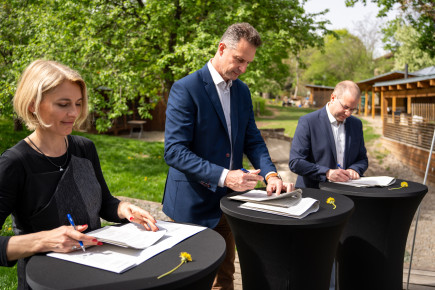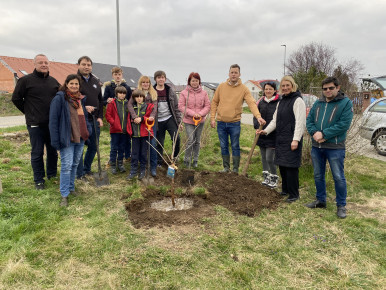Roundtable in Mikulčice: Restoring landscape to defend against tornadoes, floods, and drought
Published: Jun 17, 2023 Reading time: 6 minutes Share: Share an articleTwo years after a tornado ravaged South Moravia, we organised a roundtable on the restoration of landscape in the region. The roundtable took place in Mikulčice and was attended by actors directly or indirectly involved in restoring the local landscape and its adaptation to climate change. We discussed successes, barriers, and challenges for the future. It was undeniable that climate change is a problem that needs to be promptly addressed.
The convening of the roundtable in Mikulčice was symbolic because it is located roughly in the middle of the zone devastated by the tornado two years ago. Participants included representatives of at-risk municipalities in the Hodonín and Břeclav region, academics, representatives of ministries, the South Moravian Region, other state institutions, and NGOs. For nearly five hours, they talked about what has and has not worked and what challenges they face in the future.
There seems to be a consensus that the problem of climate change can no longer be ignored. And mitigation is already underway in most municipalities. Trees are being planted, streams meandered, dry polders and pools created. Sharing successes was the most enjoyable part of the meeting. However, there are still many barriers to implementing adaptation measures, which the participants in Mikulčice identified. Representatives of municipalities and NGOs vividly discussed the issues with representatives of the South Moravian Region and state institutions, which was appreciated.
Green infrastructure is finally in legislation, but it's not enough; we need to go further
Associate Professor Alena Salašová from the Institute of Landscape Planning at Mendel University participated in the roundtable. Under her guidance, students have created green space restoration studies for four of the five tornado-affected communities. In Mikulčice, she expressed appreciation that the term green infrastructure is finally anchored in legislation. However, she noted that spatial planning does not know how to elaborate on developing the green infrastructure system, although it works with the Territorial System of Ecological Stability. She added that, unlike other infrastructures such as water and sewage systems, gas pipelines, electricity cables, etc., there is no institution for green spaces to comprehensively deal with its renewal.
Martin Bílý, Deputy Director of the Climate Change Adaptation Department at the Ministry of the Environment, confirmed that green spaces did not yet have the same level of protection as other infrastructure. However, he noted this should soon change, which was very positive news for those present.
Several mayors commented on the inability to protect certain green spaces in the built environment and the obligation of municipalities to restore them. Post-tornado, small municipalities are struggling and need help from the state, counties, municipalities with extended jurisdiction, and non-profits. Larger municipalities are better off because they continuously implement multiple projects and thus need "only" adjust plans already in place after the tornado. However, the Deputy Mayor of Hodonín, Ondřej Fialík, also warned the present Director of the National Programmes Implementation Department, Michal Slezák, about the risk associated with the insufficient length of subsidy support for post-planting care. This is currently three years, but it should be at least five years in the arid South Moravian region. In Hodonín, where over a thousand trees had to be planted after the tornado, they are thus at significant risk of financial losses if some of the planting is not taken up.
Unfinished complex land improvements were a major topic of the roundtable. This was because municipalities often do not have enough land for them and cannot implement many necessary measures. Several questions were directed to the Director of the Institute of Territorial Development, Jakub Kotrle, who promised to provide municipalities with the missing information for further action.
Face to face, inspiration and cautious promises for the future
The roundtable allowed participants to talk directly about controversial issues. For example, Vladimíra Požgayová, Deputy Mayor of Kostice, complained that the South Moravian Region did not support the municipality in a dispute with a gas company that blocked the municipality's ability to plant windbreaks. This was despite the municipality having acquired suitable land for them as part of the land improvements. Deputy Governor Lukáš Dubec listened to this and promised better cooperation in the future, despite legal limits.
At the same time, situations were shared to inspire other municipalities. For example, in Kostice, the Memorandum of Cooperation with a local farmer, Masaryk University and nature conservationists proved helpful in landscape protection. Inspiration was also provided by the examples of meandering of streams presented by David Veselý, Project Manager of the Morava River Basin.
Jana Krutáková, MP, also attended the roundtable. She is a resident and former mayor of the tornado-hit Moravská Nová Ves. She offered the participants the opportunity to participate in the legislative process at the parliamentary level.
At the end of the meeting, several optimistic statements were made. For example, Deputy Governor Lukáš Dubec promised those present that he would establish a regional working group, which would be coordinated directly by the South Moravian Region in the future. This was greatly appreciated by all participants.
The determination to address the threats to the landscape of their home expressed by the participants present during the roundtable discussions suggests that much more work remains to be done.
Climate adaptation plans are being developed in Dolní Bojanovice, Hrušky and Lužice. Planting is already underway in Dolní Bojanovice.Our organisation, People in Need, helps small municipalities to restore their landscapes and greenery. In Dolní Bojanovice, we have been working since the disastrous floods that struck just three days before the tornado. Together with the municipality, we are developing a landscape that should mitigate or prevent flooding in the future. Municipal officials, farmers, and active citizens are involved in mapping, planning and decision-making. Together with the Partnership Foundation, we are preparing climate-adaptation plans in Dolní Bojanovice and nearby Hrušky and Lužice, which will restore greenery in the villages and provide rainwater management and energy saving. Such projects are examples of good practice for other municipalities in the Hodonín and Břeclav regions in the future.


